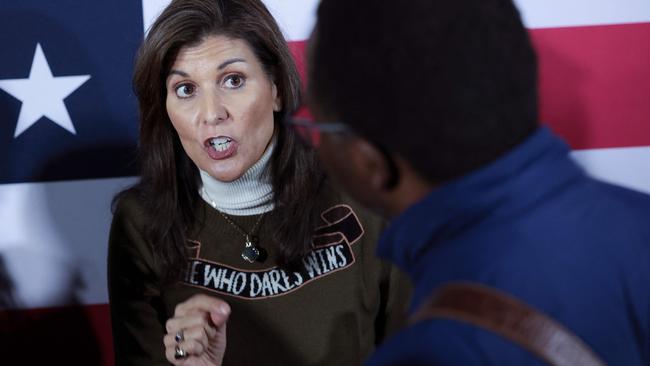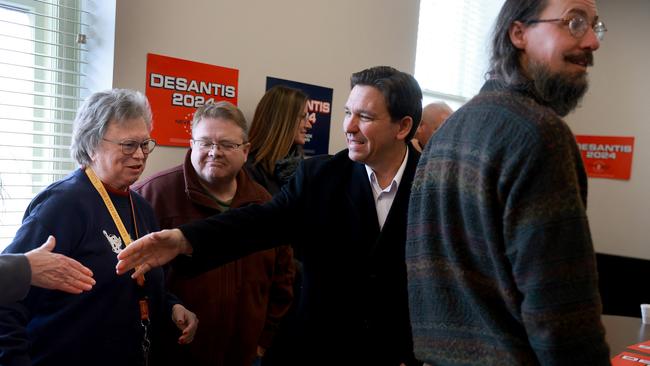Where Haley, DeSantis can find support in Iowa caucuses
Trump is polling far ahead of GOP rivals in the Iowa caucuses, but pockets of possible strength await Republican challengers

With the Iowa caucuses a day away, Republican presidential hopefuls are making their closing arguments in the state, where former president Donald Trump is polling at roughly 50 per cent, according to the FiveThirtyEight average. That puts him well ahead of Florida Governor Ron DeSantis and former UN ambassador Nikki Haley in the contest, in which likely less than half of all Iowa Republicans will participate. Despite Trump’s lead, his rivals could find pockets of support from voters across the Hawkeye State on Monday (Tuesday AEDT).
Evangelical Protestants
With polls pointing to a close race for second place, DeSantis is betting heavily on a strong performance in Iowa to preserve his viability. A bright spot for him in the December Des Moines Register/NBC News/Mediacom Iowa Poll was his somewhat stronger support among evangelicals: 26 per cent compared with 19 per cent among all likely caucus-goers. If he is to build support with those voters, it could come from places such as Sioux County, which has the state’s second-highest share of evangelical Protestants, according to the 2020 US Religion Census from the Association of Religion Data Archives.
Trump underperformed in Sioux County in the 2016 caucuses. DeSantis might also perform well in smaller evangelical strongholds on the state’s southern border, including Davis and Wayne counties, where the evangelical-adherence rate has increased significantly over the past decade compared with other parts of the state.
College-educated women
Trump has support among 39 per cent of college-educated Republicans in the state, but 30 per cent of white women with a college degree, according to the December Iowa Poll. That could give Haley an opening in places such as Dallas County, where 19 per cent of all Republicans are women with a college degree, the highest rate in Iowa.

Overall, college-educated women as a share of women aged 25 and older in this growing suburban county have increased by more than 10 percentage points in a decade — the second-highest rate of increase among Iowa’s 99 counties.
Wealthier Republicans
A Wall Street Journal poll in December of Republican voters nationwide showed Haley performing best among households earning more than $US100,000 compared with lower-income voters. With Trump enjoying his biggest support among lower-income voters, according to polls, Haley or DeSantis could make inroads in more-affluent places in and around the Des Moines metro area, where Haley has spent considerable time campaigning.
Nearly a third of registered Republicans live in the seven counties with the largest shares of Republicans whose household incomes top $US100,000, making them fertile ground for Trump’s rivals.
Independents
Haley also appears to be relatively popular with independent voters, 23per cent of whom say she is their first choice, compared with 16 per cent of likely caucus-goers who say so, according to the Iowa Poll.
Registered independent voters can’t participate in the Republican caucuses, but may register as Republicans on caucus day. If party-switching is to have an impact, Haley might look to the east, specifically the Davenport area of Scott County, where Trump had one of his weaker performances in the 2016 caucuses and where he lost in both the 2016 and 2020 general election.
Note: Demographic data based on registered Republican voters. Some data are estimates modelled on other known characteristics. Sources: L2, a nonpartisan voter file vendor; Iowa secretary of state (voter registration); Dave Leip’s Atlas of U.S. Presidential Elections (2016 turnout); Association of Religion Data Archives (evangelicals)
The Wall Street Journal



To join the conversation, please log in. Don't have an account? Register
Join the conversation, you are commenting as Logout